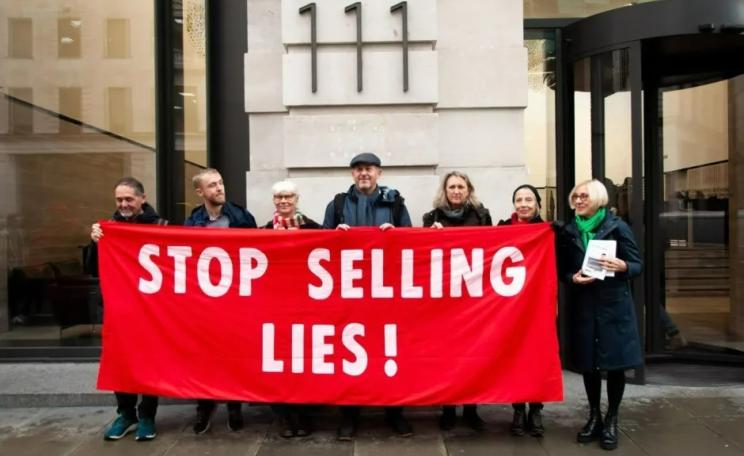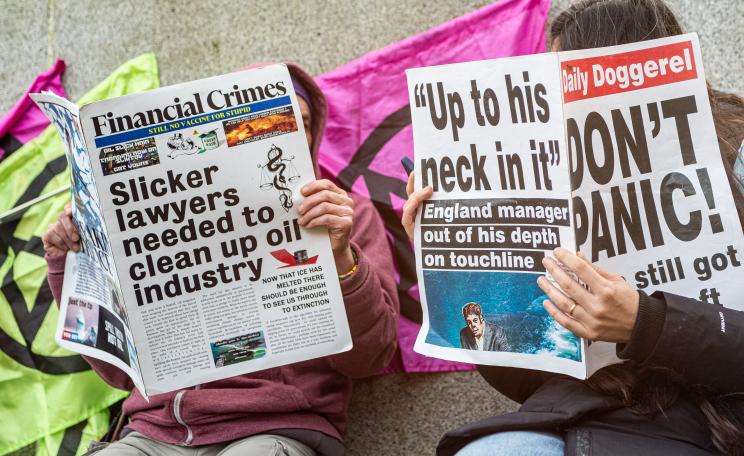The choice is ours: keep funding destruction every time we renew our insurance policy, or demand accountability from the companies that profit off our trust.
Most people see insurance as protection – a way to safeguard homes, families, and livelihoods against disaster. But behind the glossy adverts and reassuring slogans, two of the world’s biggest insurers are underwriting destruction on a global scale.
Communities across six continents are planning coordinated actions this month against two of the worst: AXA and AIG. For years they have fueled climate breakdown, ecological collapse, and war.
Oil pipelines, coal mines, and new gas fields cannot be built without insurance. Neither can arms dealers or military supply chains.
Emissions
Insurance is what makes destructive industries financially viable. Without it, projects stall, costs soar, and investors walk away.
That’s why campaigners are targeting AXA and AIG. By withdrawing insurance, we can strike at the hidden infrastructure that allows fossil fuel expansion and militarised violence to continue.
French giant AXA has been linked to dozens of so-called “carbon bomb” projects – mega fossil fuel developments projected to unleash over 200 gigatonnes of greenhouse gas emissions: equivalent to decades of the European Union’s entire output (in 2023 the EU's net emissions were approximately 2.9 gigatonnes).
AXA has also insured projects tied to colonial fossil fuel expansion, such as TotalEnergies’ gas fields in Mozambique, and has backed companies linked to deforestation in the Amazon. For frontline communities, these numbers translate into deadly floods, fires, crop failures, and forced displacement.
American insurer AIG remains one of the world’s largest underwriters of oil and gas expansion. It has refused to rule out backing the East African Crude Oil Pipeline (EACOP) – a 1,443-kilometre project threatening to displace thousands in Uganda and Tanzania while locking in huge new emissions.
Scrutiny
AIG’s record also includes insuring supply chains that provide the fuel and logistics enabling Israel’s assault on Gaza.
What makes these practices worse is that fossil fuels and arms account for only a tiny fraction of insurers’ revenues. The vast majority comes from ordinary customers paying for car, home, health, and life insurance.
We pay for protection but our premiums are quietly funnelled into destruction.
It is tragically ironic that the climate breakdown underwritten by these companies will mean that eventually all businesses will become uninsurable leading not only to a breakdown of civil society but to the demise of their own industry: an incomprehensible act of corporate suicide.
The choice is ours: keep funding destruction every time we renew our insurance policy, or demand accountability from the companies that profit off our trust.
Campaigners believe insurers are uniquely vulnerable to consumer pressure. Research shows that ethical concerns strongly influence consumer choices, and insurers have already backed down under scrutiny.
Trust
Dozens of companies have walked away from the Adani coal mine in Australia and 29 have walked away from the EACOP project.
For campaigners, the September wave of action is about more than two companies. It is about confronting the interconnected systems that link climate chaos, colonial exploitation, and militarised violence. From the Niger Delta to Gaza, from the Amazon to East Africa, the same insurers are enabling the same patterns of destruction.
By exposing AXA and AIG, campaigners hope to force a reckoning across the industry — and to remind ordinary policyholders that their premiums can either fund destruction or help build a future rooted in justice and survival, our own included.
The mobilisation, running from Monday, 8 September 2025 through to Monday, 22 September 2025, will include blockades, creative protests, and public education campaigns from Europe to Africa to the Americas.
As one organiser put it: “The choice is ours: keep funding destruction every time we renew our insurance policy, or demand accountability from the companies that profit off our trust.”
This Author
Tom Hardy FRSA has over 40 years of experience in education, serving as literary editor for the International Journal of Art and Design Education, as columnist for the Times Educational Supplement, and author/editor of several academic works on educational practice. He has worked as an education consultant for the Prince's Teaching Institute and subject lead for the Qualifications and Curriculum Development Agency reporting to the Department for Education. He now works with Media Revolution.
For more information about Insure Our Survival, visit the website at: insureoursurvival.org.






